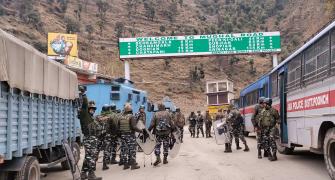A new study on global warming says massive atmospheric changes may drive many varieties of plants and crops, including potatoes and peanuts, to extinction by 2050.
A study by the Consultative Group on International Agricultural Research (CGIAR) said that by mid-century, global warming will wipe out traits that might help modern crops resist pests or disease.
The findings said many wild relatives of other crops -- including wheat, rice or barley could be at risk.
"A number of wild species will be highly threatened by climate change -- they are losing areas suitable as their habitat," said Annie Lane, one of three authors of the CGIAR study. CGIAR backs 15 farm research groups in the world.
It said 61 per cent of 51 species of wild peanut and 12 per cent of 108 wild potato species would go extinct in the next 50 years because of the global warming caused by greenhouse gases released by human use of fossil fuels.
Peanuts, which originated in South America, are at risk because they thrive in flat regions, where any climate change quickly affects a big area. The peanuts also grow underground, near the parent plant, limiting their ability to move.
Potatoes, found in the Andes mountains, could more easily extend their range upwards to find cooler temperatures. A strain of wild potato with genes resistant to blight, infamous for causing the 1840s famine in Ireland which killed about a million people, was among species at risk of extinction, the study said.
The study that also examined the vigna or cowpea, which is an important food crop in Africa and most resilient in the climate models with just two of 48 wild strains is also at risk of extinction.
It pointed out that hardy plants that thrive in a broad range of climates could benefit.
Saying that there is an urgent need to identify and effectively conserve crop wild relatives that are at risk of climate change, the study urged governments across the world to do more to preserve the wild relatives of crops in nature and in seed banks.






